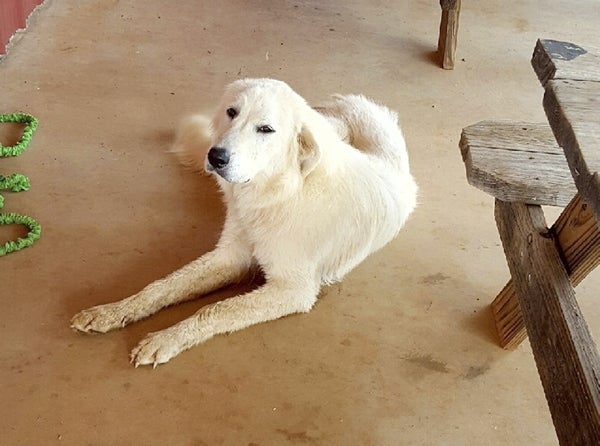Guard dog or guard donkey? Some answers
Published 12:00 am Friday, April 14, 2017

- Submitted photo A Great Pyrenees dog makes a good guard animal for livestock.
By Morgan Watts
Rowan Cooperative Extension
If you have ever raised livestock or poultry, you have most likely had to deal with some type of predator issue. If you haven’t, consider yourself lucky, so far.
I am going to go over some different types of guard animals that will work mostly for livestock, and some will even work for poultry predator protection. There are many pros and cons to which type to use — some require different care than others. One that works for your neighbor might not work for you. It’s all about your specific operation’s setup and goals.
Probably one of the most common types of guardians would be a dog. There are a ton of different breeds available, but the most common in our area would be the Great Pyrenees or Anatolian Shepard. Dogs are probably the most versatile and can work for sheep, goats, cattle and poultry.
Negatives with them are getting them trained. The puppy stage can be difficult — they can chew up things, dig holes in the pasture, and sometimes are hard to contain in a fence. They also require being fed separate and occasionally, depending on their hair type, may need to be shaved yearly. If properly trained, they can work for just about any operation.
Another option would be a donkey. Donkeys are not common to protect poultry, but a lot of people have success using them with cattle. Some people use them in sheep/goat flocks and have success also.
It’s just important to get one that is trained properly, as they can attack baby calves, sheep and goats if they have not been raised around them all their life.
Donkeys require the least amount of upkeep. They will occasionally need their feet trimmed, but they can eat with your livestock and don’t require shearing.
Last, a llama is an option. They are a lot like the donkey in the way they work. They are suitable for livestock but not poultry. They can graze/eat alongside the livestock. Negatives for them would be that they may want to play with young lamb, goats and calves and could potentially harm them.
They will also require shearing and hoof trimming. They may also share the parasite loads with your livestock, so they will require deworming.
No matter what type of guard animal you choose, try to get one that is well trained and from good bloodlines. It is also important to make sure that they stay with your animals and don’t try to escape or run away. The key is getting them to bond with your stock.
When looking for a good guard animal, make sure that they are purchased from someone with experience in raising guard animals and that they stand behind the animals they produce in case you experience any issues.
If you have any questions about what type of guardian might work best for you and your operation, please call Morgan Watts, livestock agent, at Rowan County Cooperative Extension, 704-216-8970, or stop by at 2727-A Old Concord Road.



